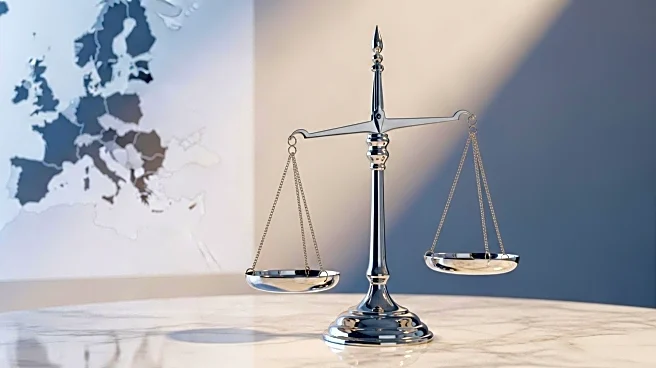What's Happening?
The European Union is considering the introduction of secondary sanctions aimed at preventing third countries from assisting Russia in circumventing existing EU sanctions. This move is part of the EU's ongoing efforts to strengthen its punitive measures against Moscow. The proposed sanctions are expected to be included in the EU's 19th package of sanctions, which is primarily focused on addressing the issue of Russian kidnappers of Ukrainian children. This particular issue has gained attention from US President Trump during discussions with European leaders at the White House.
Why It's Important?
The potential introduction of secondary sanctions by the EU represents a significant escalation in the bloc's efforts to isolate Russia economically and politically. By targeting third countries that may facilitate Russia's evasion of sanctions, the EU aims to close loopholes and increase pressure on Moscow. This move could have wide-ranging implications for international trade and diplomatic relations, particularly for countries that maintain economic ties with Russia. The focus on Russian kidnappers of Ukrainian children highlights the humanitarian aspect of the conflict and underscores the EU's commitment to addressing human rights violations.
What's Next?
If the EU proceeds with the implementation of secondary sanctions, it may lead to increased diplomatic tensions with countries that are perceived to be aiding Russia. The effectiveness of these sanctions will depend on the EU's ability to enforce them and the willingness of third countries to comply. Additionally, the focus on Russian kidnappers of Ukrainian children may prompt further international scrutiny and pressure on Russia to address these human rights concerns. The EU's actions could also influence US policy, as President Trump has shown interest in this issue during discussions with European leaders.
Beyond the Headlines
The introduction of secondary sanctions could set a precedent for future international sanctions regimes, potentially leading to more comprehensive and coordinated efforts to address global conflicts and human rights violations. This development may also prompt discussions on the ethical implications of using economic sanctions as a tool for achieving political and humanitarian objectives. The EU's focus on Russian kidnappers of Ukrainian children highlights the complex interplay between geopolitical strategy and human rights advocacy.









